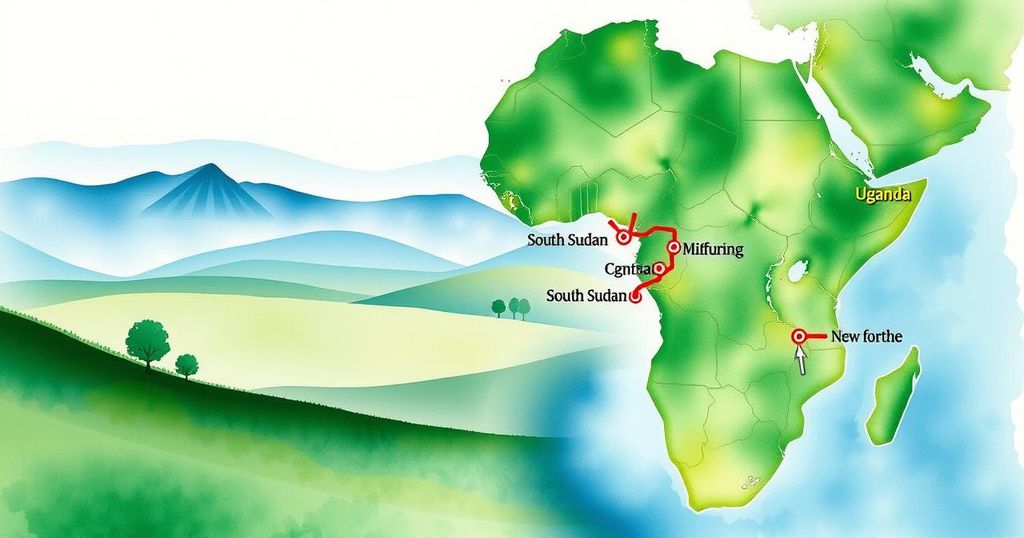Global news
AFRICA, CENTRAL AFRICA, CIVIL WAR, CONFLICT RESOLUTION, GREATER YEI RIVER COUNTY, IGAD, LRA, NASIR, REFUGEES, RI, RIEK MACHAR, SAL, SALVA KIIR, SOUTH SUDAN, SUDAN PEOPLE ’ S LIBERATION ARMY, TRANSITIONAL GOVERNMENT, UGANDA, UGANDAN PEOPLE ’ S DEFENSE FORCE, UPDF, YEI RIVER, YO
Isaac Bennett
0 Comments
Navigating South Sudan’s Relationship with Uganda: A Call for Strategic Diplomacy
South Sudan faces significant challenges in balancing its relationship with Uganda amidst historical ties and political tensions. Uganda’s past support and military involvement have complicated South Sudan’s internal dynamics. The nation’s future hinges on establishing a balanced foreign policy that addresses governance issues while fostering diverse regional partnerships.
South Sudan, the world’s newest nation, is currently at a pivotal point as it manages its complex relations with Uganda. These two nations possess historical ties rooted in cultural connections, yet they face contrasting political agendas. Such dynamics play a critical role in influencing not only the stability of South Sudan but also the regional landscape and economic growth.
During its protracted struggle for independence, which concluded on July 9, 2011, South Sudan received considerable support from Uganda. The Ugandan military, directed by President Yoweri Museveni, aided the Sudan People’s Liberation Army (SPLA) in its fight against the Sudanese government. Nevertheless, this collaboration has often been seen as part of a broader initiative to combat the Lord’s Resistance Army (LRA), which was actively resisting the Ugandan state.
Post-independence, the relationship between South Sudan and Uganda oscillated between collaboration and rivalry. South Sudan has emerged as a lucrative market for Ugandan goods and labor, while Uganda has been instrumental in facilitating peace initiatives, particularly through regional organizations like the Intergovernmental Authority on Development (IGAD). This partnership has enabled crucial trade routes, vital for landlocked South Sudan’s economy.
Despite these cooperative elements, tensions have pervaded the relationship. Uganda’s military presence in South Sudan became particularly controversial following the outbreak of civil war in December 2013, when the Ugandan People’s Defense Force (UPDF) intervened on behalf of President Salva Kiir against the opposing faction led by Riek Machar. This involvement intensified both military and political strife, producing extensive loss of life and damage to property, alongside compounding issues on humanitarian fronts, especially in conflict-affected regions.
Although the internal conflict of South Sudan officially ended with a peace agreement in 2018, the nation remains fragmented and faces severe governance challenges and a deteriorating humanitarian crisis. Consequently, relations with Uganda transcend mere friendship or antagonism; they have become deeply embedded within broader geopolitical considerations, particularly regarding both nations’ operations in the Democratic Republic of Congo (DRC) and Somalia.
In conclusion, South Sudan stands at a crucial juncture in its attempts to navigate its relationship with Uganda and confront the implications of external influences. By developing a diplomatic strategy that ensures economic independence and enhances regional partnerships, South Sudan can work towards stabilizing its governance structures and minimizing foreign interference. An inclusive governance approach may pave the way for lasting peace and autonomy, allowing the nation to avoid entanglement in regional political struggles.
Original Source: www.radiotamazuj.org




Post Comment